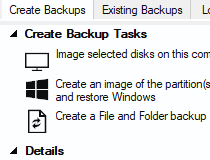

There are other differences with restored partitions, compared to the original partitions here is a screenshot: I removed the drive letter associated with the partition, but that did not change anything on the new desktop - still won't start. Looking at the restored image on the old HD on my old desktop, I noticed the "System reserved" partition was showing up as another hard drive (I expect this partition to be hidden). I've checked the bios setting, made sure the HD is first in the boot sequence, but the result is the same. However, when I plugin this HD into the new desktop, it won't boot the bios just says "Checking Media Presence.", and won't start. I imaged my existing SSD (bootable c: drive), and then restored that image onto an older HD. Now, I'm a bit nervous about this move, so I figured I would do a dry run first. It seems that this could be as simple as just moving the drives over, maybe even without running sysprep. I'd like to move my existing SSD + HD over to the new Lenovo desktop. My existing desktop has a 460GB SSD + 3 TB HD. It comes with a pitiful 100 GB SSD + 1 TB HD. Instructions, documentation and other important information about viBoot is available in this KnowledgeBase article: Introduction to Macrium viBoot.I bought a new desktop (Lenovo Gaming IdeaCentre Computer, Y710 Cube-15). Windows 8 and above (64bit only) / Windows Server 2012 R2 and above.

The type of virtual machine to create is automatically detected by viBoot based on the virtualization software installed on the host. Macrium viBoot is now built upon new technology that allows it to instantly present a Macrium Reflect image file as a Microsoft Virtual Disk (.VHDX) or VirtualBox (.vmdk) file.


At an enterprise level, you could recover an entire network environment in minutes. Macrium viBoot enables you, to instantly create, start and manage Microsoft Hyper-V and VirtualBox virtual machines using one or more Macrium Reflect image files as the basis of the virtual machine storage sub-system.Īt a minimum, viBoot enables you to boot into the images you have made using Macrium Reflect, for validation purposes, or to retrieve data from old applications stored on a bootable image.


 0 kommentar(er)
0 kommentar(er)
